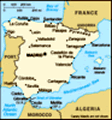Advertisement
Published: February 4th 2011
We were simply amazed
Girona didn't live up to our expectations, it was far above our expectations, it left our expectations in the dust! In the words of the modern phrase, "It blew us away."
Shock and awe
Perhaps shock is too strong a word, but we walked around the ancient streets in awe of what we saw. One section of town looks as if it has not changed in 500 years. Narrow streets, narrower alleyways, stone streets and buildings greeted us. Add a city wall, yes a city wall, where we walked and walked and walked. This is the third city wall we have been able to walk on in our travels. The first was in Xi'an, China, the second was Rothenberg in Germany and now Girona in Spain. We have seen portions of city walls, such as in Nymbrurk, here in the Czech Republic, but none we have seen in the Czech Republic have been open to be walked upon.
Predates the Romans.
Girona is a very old city outdating even the Roman Empire and has seen many rulers. After the Roman conquest, the Visigoths, then the Moors took over until Charlemagne
ran them out in 785 a.d. In the 12th century there was a thriving Jewish community here that contained one of the Kabbalistic schools. The city has seen sieges by a number of armies ... several times by the French. Fortunately it was peaceful while we visited.
Fast food
We only had one night and part of the next day to visit. Because of this we cannot recommend any restaurants as we didn't eat in any. When we got hungry we stopped at a shop that was open to the street and bought open faced sandwiches. They were like a pizza only the cheese and tomatoes were on a baguette. We nibbled on these as we walked.
Don't go to sleep
Girona is easy to go to by train as it is on the mail line between Barcelona and Figueres. This is the line we took from Italy into Spain and later back to Italy. There are numerous commuter trains daily from and to Barcelona. If you are visiting Figueres to see the Dali Museum (and the other interesting places we told you about there, catch a train early in the morning and Girona would be
a nice day trip.) However, to get the most magical effect of the city, I would recommend you arrive, as we did, after dark. Don't go to your hotel and go to bed. Dump your luggage and take off along the river till you come to a bridge, go across, turn left and to uphill. The old city streets are lighted at night with lamps just far enough apart to make it seem as if you have gone back in time several hundred years. You wander through the old twisting streets wondering if you will become hopelessly lost (you won't just head back down hill on any street) while your mind reels with dreams of long ago. Go all the way to the very top of the hill to the ancient church and then pick your way back through the maze on different streets. You will never regret spending an evening in the city. Then the next morning get up early and go back up - things will look different but you will feel more adventuresome since you now KNOW you can find your way back to the newer part of town and the train station. Go all the
way up and to your right this time so you can find the city wall, climb up and then go down several places into the small, hidden gardens. Visit the church and feel time disappear again in the ancient surroundings. I can promise you will be so enchanted you will never forget Girona.
Spanish
Oh, for those of you who speak Spanish or are learning to speak Spanish. I was trying to say Girona properly giving the G a nice H sound. Everyone understood me it seemed. Then when our train arrived near Girona I was surprised to hear everyone including the train conductor saying Girona with a very definite G sound. The Catalonian language is spoken all over this area of Spain and they are gladly readopting the proper pronunciation and spelling of words in their own language not in the Spanish which was forced on them for so many years. Don't wonder what Calle your hotel is on ask about the Carre your hotel is on, etc. All signs are written both in Catalonian and Spanish. Of course everyone understands both languages so don't avoid the area if you 'only' speak Spanish. I quickly learned that

 Who is this?
Who is this?
Does he live in one of the old houses? Many people do. Or is he also a visitor enchanted by the town?it is not only the Basques who feel 'un-Spanish' in Spain. Different regions are fiercely independent in thinking and in regional dialects and customs.
Advertisement
Tot: 0.117s; Tpl: 0.016s; cc: 13; qc: 25; dbt: 0.0444s; 1; m:domysql w:travelblog (10.17.0.13); sld: 1;
; mem: 1.1mb























